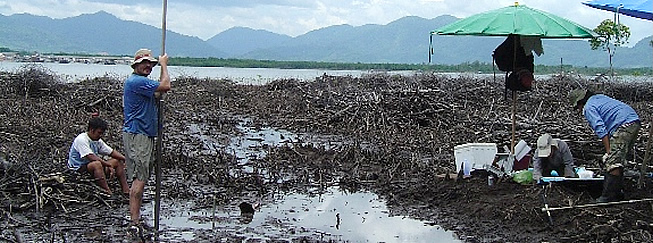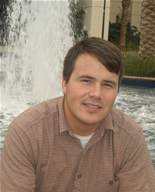| "Tightrope" Talk on Global Warming |
||
|
| CSUF Professor Treads a Thin Line Between Science and Politics
July, 12, 2007 :: No. 2 What looks like a straightforward talk about previous and current climate actually has elements of a tightrope walk, one that Matthew Kirby has walked before. Kirby is a paleoclimatologist and assistant professor of geological sciences at Cal State Fullerton, and his subject is global warming. Sponsored by the Osher Lifelong Learning Institute, the free lecture will be from 1:15 to 3:15 p.m. on July 26 in the Ruby Gerontology Center at CSU Fullerton. “I’ve given this talk before to various community groups and I expect I will give more as this issue becomes increasingly visible,” Kirby, of Buena Park, said, leading into an explanation of his “tightrope walk.” “Global warming can rile people as much as an issue like abortion, which is seen as a moral or ethical issue. Global warming is actually a scientific issue,” the educator said. “This subject has become politicized, so it isn’t just about science when it is discussed publicly. Last year, Amy Coplan (CSU Fullerton assistant professor of philosophy) gave a talk in one of my classes about why people attach such meaning and emotional energy to environmental issues. One reason is because these issues are politically charged. I’m a scientist, and I’m not certain that everyone in my own family believes what I say about the scientific evidence that supports global warming because of the political association. “I begin each talk with background information, Kirby explains. “I tell the audience, for example, it is irrelevant that there was more carbon dioxide in the atmosphere when dinosaurs roamed the Earth than there is today, an argument often made by those who think global warming is a hoax. Because there were no humans to add C-O-2 to the atmosphere, the comparison is inappropriate. To keep the comparison scientifically valid, we focus on the past several hundred thousand years, when Earth’s conditions were reasonably similar to today.” “I also mention the funny conspiracy theory that scientists are getting rich from studying global warming,” Kirby said. But he has never seen evidence of a conspiracy and doesn’t know any scientists who are getting rich from studying this issue. “Certainly I’m not,” he added. One of the more compelling scientific facts, Kirby said, involves analysis of the air bubbles trapped in glacial ice in Greenland and Antarctica. “This ice goes back more than half-a-million years and shows that the maximum amount of atmospheric carbon dioxide rarely exceeded about 300 parts per million. At no time, according to the ice-core records, did the C-O-2 rise anywhere close to its present value of about 380 parts per million.” Furthermore, Kirby said, the dips and rises in atmospheric carbon dioxide— known to be a potent greenhouse gas — were gradual over that time frame. “Currently, atmospheric C-O-2 is about 380 parts per million, a dramatic rise since about 1800 AD, when atmospheric C-O-2 levels were at about 280 parts per million,” he pointed out, a time period that coincides with the beginning of the Industrial Revolution. “Actually, there is little, if any, debate that there is more C-O-2 and that the climate is warmer today than in 1850 AD. The debate, really, is whether the rise in Earth’s temperature is caused by humans, or is entirely natural.” “Another problem is that scientists rarely say that something is an absolute, particularly in the science of climate prediction,” the paleoclimatologist pointed out. “For example, the latest IPCC (Intergovernmental Panel on Climate Change) report states that global warming is real and that it is caused by human activity. But then it assigns levels of confidence to its conclusions.” The confidence levels on greenhouse gases are quite high, but not absolute. “That’s good science, but that leaves wiggle room and, politically, people want absolutes,” Kirby said. “So, in my talk, I will just give the science. I am not an expert in the science of global warming, but, as a paleoclimatologist, certainly I have to know a lot about climate and climate change. Essentially, I provide the science behind global warming and show why scientists think what they do. “The real controversy,” he said, "begins when I take questions.” For more information about the event, call OLLI at 657-278-2446. For more information about parking, call the visitors center kiosk at
|
|

